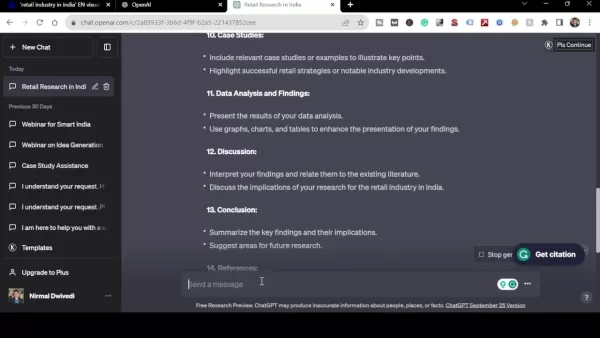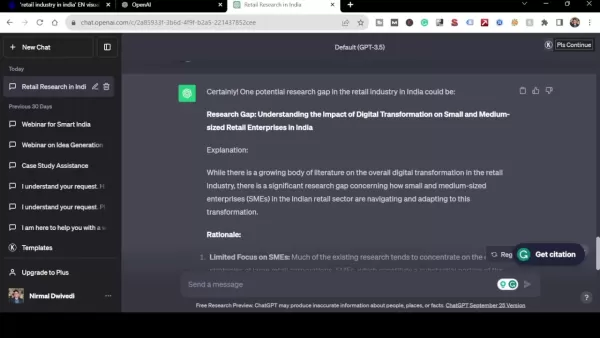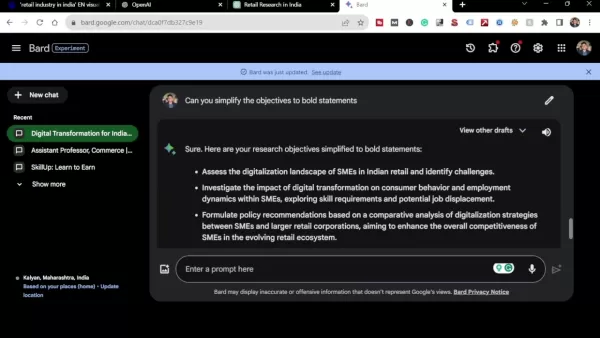Harnessing AI for Academic Research: Tools and Techniques for Streamlined Writing
Crafting a research paper can be challenging, but AI tools can simplify the process significantly. This guide delves into leveraging AI platforms like ChatGPT, Google Bard, and Bing AI to enhance every stage of academic writing, from generating ideas to polishing the final manuscript. Discover how these advanced tools can elevate your research and writing efficiency.
Key Highlights
Use AI platforms such as ChatGPT, Google Bard, and Bing AI to support various phases of research paper development.
Tap into 'Answer The Public' to spark research ideas and uncover trending topics.
Employ AI for brainstorming, structuring, and drafting research paper sections.
Refine prompts to achieve precise and reliable outputs from AI models.
Always review and edit AI-generated content to ensure accuracy and originality.
Generating Research Ideas with AI
Using 'Answer The Public' for Topic Inspiration
Struggling to find a research topic? Try 'Answer The Public'. This tool reveals what questions people are asking online about a specific subject. By inputting a broad term, you can explore a variety of potential research areas.

For instance, entering 'retail industry in India' reveals what people are searching for. The tool generates a visual map of questions, comparisons, and related terms, serving as starting points for your research. These insights help identify gaps in current studies or highlight emerging trends.
Conducting Keyword Research for Trending Topics
Keyword research is vital for pinpointing high-interest topics. Tools like Ubersuggest are highly effective.

By evaluating search volumes and competition levels, you can identify relevant, high-impact research topics. This ensures your work is timely and addresses pressing industry questions.
Writing Research Papers with AI Assistance
AI for Outlining and Brainstorming
Once you have a topic, creating an outline is the next step. AI tools can streamline this process. Submit a prompt to your AI model, such as, 'Generate an outline for a research paper on the retail industry in India.'

The AI will produce a structure including sections like Title, Abstract, Introduction, Literature Review, Methodology, Industry Overview, Market Trends, Regulatory Environment, Challenges and Opportunities, Case Studies, Data Analysis, Discussion, Conclusion, References, and Acknowledgments. This saves time in organizing ideas and structuring your paper.
Drafting Paper Sections with AI
With an outline in place, use AI to draft individual sections. Provide specific prompts for each part, such as the Methodology section, and the AI will generate relevant content. Always review and refine these drafts to align with your research goals and ensure accuracy.

Well-crafted prompts yield better results.
Crafting Compelling Titles
ChatGPT is an excellent tool for generating titles. Provide a topic like the retail industry, refine it further, and request title suggestions. An example might be, 'Digital Transformation in Indian Retail: A Study of Small and Medium Enterprises.'

How to Use AnswerThePublic
Finding a Topic
Open your preferred search engine, such as Google.

Search for AnswerThePublic and visit the website.
Input a topic you’re interested in researching.
Click search to access a variety of topic angles and a keyword wheel for your query.
Pricing for AnswerThePublic and ChatGPT
Pricing Breakdown
AnswerThePublic, created by Neil Patel, and ChatGPT both offer free and paid versions for generating topics and content. The table below outlines their pricing structures.
Services Free Tier Paid Tier AnswerThePublic Limited daily searches More searches, historical data, project management features ChatGPT (OpenAI) Access to GPT-3.5, limited GPT-4 usage Full GPT-4 access, plugins, priority support, faster responses, higher limits
ChatGPT vs. Google Bard
Pros
Both are AI-driven chat platforms.
They offer similar functionalities with distinct differences.
Developed by major companies, OpenAI and Google.
Both are continuously improving.
Cons
Content may occasionally be inaccurate.
Chatbots could dominate certain tasks.
Still in development and testing phases.
Lack human emotions and experiences.
Frequently Asked Questions (FAQ)
Can AI tools fully replace human researchers?
AI tools greatly enhance the research process but cannot replace human researchers. They assist with tasks like idea generation, data analysis, and drafting. However, human expertise is crucial for critical analysis, contextual understanding, and ethical considerations.
What are the limitations of AI in academic research?
Despite their benefits, AI tools have limitations, including potential biases, inaccuracies, and lack of contextual depth. They cannot conduct original research. Human researchers must thoroughly review AI outputs to ensure accuracy, objectivity, and originality.
Is using AI tools for research papers ethical?
Using AI tools in academic research is ethical if done transparently and responsibly. Acknowledge AI use in your paper, review and revise content to uphold academic integrity, and avoid plagiarism while clearly distinguishing original work from AI-generated material.
Related Questions
What is the future of AI in academic research?
AI’s role in academic research is poised for growth. As technology advances, AI tools will support more tasks, including literature reviews, data synthesis, and research design. However, human oversight will remain essential to ensure quality, originality, and ethical standards.
Related article
 AI-Generated Crossover Unites Arthur Morgan and Joshua Graham in Gaming Multiverse
When Gaming Worlds Collide: Arthur Morgan Meets the Burned ManPicture a realm where legendary game characters step beyond their own stories - what unfolds when Red Dead Redemption 2's Arthur Morgan crosses paths with Fallout: New Vegas' scarred proph
AI-Generated Crossover Unites Arthur Morgan and Joshua Graham in Gaming Multiverse
When Gaming Worlds Collide: Arthur Morgan Meets the Burned ManPicture a realm where legendary game characters step beyond their own stories - what unfolds when Red Dead Redemption 2's Arthur Morgan crosses paths with Fallout: New Vegas' scarred proph
 Microsoft hosts xAI's advanced Grok 3 models in new AI collaboration
Earlier this month, my *Notepad* investigative journalism uncovered Microsoft's plans to integrate Elon Musk's Grok AI models - revelations that have now been officially confirmed. Today at Microsoft's annual Build developer conference, company execu
Microsoft hosts xAI's advanced Grok 3 models in new AI collaboration
Earlier this month, my *Notepad* investigative journalism uncovered Microsoft's plans to integrate Elon Musk's Grok AI models - revelations that have now been officially confirmed. Today at Microsoft's annual Build developer conference, company execu
 Depeche Mode's Faith Songs Get AI Remix & Deep Analysis
(or if shorter needed)
AI Remixes and Analyzes Depeche Mode's Songs of Faith
Depeche Mode's groundbreaking album Songs of Faith and Devotion stands as a defining moment in electronic music's evolution. Released in 1993 during the band's creative zenith, this masterwork boldly redefined their signature sound by blending indust
Comments (0)
0/200
Depeche Mode's Faith Songs Get AI Remix & Deep Analysis
(or if shorter needed)
AI Remixes and Analyzes Depeche Mode's Songs of Faith
Depeche Mode's groundbreaking album Songs of Faith and Devotion stands as a defining moment in electronic music's evolution. Released in 1993 during the band's creative zenith, this masterwork boldly redefined their signature sound by blending indust
Comments (0)
0/200
Crafting a research paper can be challenging, but AI tools can simplify the process significantly. This guide delves into leveraging AI platforms like ChatGPT, Google Bard, and Bing AI to enhance every stage of academic writing, from generating ideas to polishing the final manuscript. Discover how these advanced tools can elevate your research and writing efficiency.
Key Highlights
Use AI platforms such as ChatGPT, Google Bard, and Bing AI to support various phases of research paper development.
Tap into 'Answer The Public' to spark research ideas and uncover trending topics.
Employ AI for brainstorming, structuring, and drafting research paper sections.
Refine prompts to achieve precise and reliable outputs from AI models.
Always review and edit AI-generated content to ensure accuracy and originality.
Generating Research Ideas with AI
Using 'Answer The Public' for Topic Inspiration
Struggling to find a research topic? Try 'Answer The Public'. This tool reveals what questions people are asking online about a specific subject. By inputting a broad term, you can explore a variety of potential research areas.

For instance, entering 'retail industry in India' reveals what people are searching for. The tool generates a visual map of questions, comparisons, and related terms, serving as starting points for your research. These insights help identify gaps in current studies or highlight emerging trends.
Conducting Keyword Research for Trending Topics
Keyword research is vital for pinpointing high-interest topics. Tools like Ubersuggest are highly effective.

By evaluating search volumes and competition levels, you can identify relevant, high-impact research topics. This ensures your work is timely and addresses pressing industry questions.
Writing Research Papers with AI Assistance
AI for Outlining and Brainstorming
Once you have a topic, creating an outline is the next step. AI tools can streamline this process. Submit a prompt to your AI model, such as, 'Generate an outline for a research paper on the retail industry in India.'

The AI will produce a structure including sections like Title, Abstract, Introduction, Literature Review, Methodology, Industry Overview, Market Trends, Regulatory Environment, Challenges and Opportunities, Case Studies, Data Analysis, Discussion, Conclusion, References, and Acknowledgments. This saves time in organizing ideas and structuring your paper.
Drafting Paper Sections with AI
With an outline in place, use AI to draft individual sections. Provide specific prompts for each part, such as the Methodology section, and the AI will generate relevant content. Always review and refine these drafts to align with your research goals and ensure accuracy.

Well-crafted prompts yield better results.
Crafting Compelling Titles
ChatGPT is an excellent tool for generating titles. Provide a topic like the retail industry, refine it further, and request title suggestions. An example might be, 'Digital Transformation in Indian Retail: A Study of Small and Medium Enterprises.'

How to Use AnswerThePublic
Finding a Topic
Open your preferred search engine, such as Google.

Search for AnswerThePublic and visit the website.
Input a topic you’re interested in researching.
Click search to access a variety of topic angles and a keyword wheel for your query.
Pricing for AnswerThePublic and ChatGPT
Pricing Breakdown
AnswerThePublic, created by Neil Patel, and ChatGPT both offer free and paid versions for generating topics and content. The table below outlines their pricing structures.
| Services | Free Tier | Paid Tier |
|---|---|---|
| AnswerThePublic | Limited daily searches | More searches, historical data, project management features |
| ChatGPT (OpenAI) | Access to GPT-3.5, limited GPT-4 usage | Full GPT-4 access, plugins, priority support, faster responses, higher limits |
ChatGPT vs. Google Bard
Pros
Both are AI-driven chat platforms.
They offer similar functionalities with distinct differences.
Developed by major companies, OpenAI and Google.
Both are continuously improving.
Cons
Content may occasionally be inaccurate.
Chatbots could dominate certain tasks.
Still in development and testing phases.
Lack human emotions and experiences.
Frequently Asked Questions (FAQ)
Can AI tools fully replace human researchers?
AI tools greatly enhance the research process but cannot replace human researchers. They assist with tasks like idea generation, data analysis, and drafting. However, human expertise is crucial for critical analysis, contextual understanding, and ethical considerations.
What are the limitations of AI in academic research?
Despite their benefits, AI tools have limitations, including potential biases, inaccuracies, and lack of contextual depth. They cannot conduct original research. Human researchers must thoroughly review AI outputs to ensure accuracy, objectivity, and originality.
Is using AI tools for research papers ethical?
Using AI tools in academic research is ethical if done transparently and responsibly. Acknowledge AI use in your paper, review and revise content to uphold academic integrity, and avoid plagiarism while clearly distinguishing original work from AI-generated material.
Related Questions
What is the future of AI in academic research?
AI’s role in academic research is poised for growth. As technology advances, AI tools will support more tasks, including literature reviews, data synthesis, and research design. However, human oversight will remain essential to ensure quality, originality, and ethical standards.
 AI-Generated Crossover Unites Arthur Morgan and Joshua Graham in Gaming Multiverse
When Gaming Worlds Collide: Arthur Morgan Meets the Burned ManPicture a realm where legendary game characters step beyond their own stories - what unfolds when Red Dead Redemption 2's Arthur Morgan crosses paths with Fallout: New Vegas' scarred proph
AI-Generated Crossover Unites Arthur Morgan and Joshua Graham in Gaming Multiverse
When Gaming Worlds Collide: Arthur Morgan Meets the Burned ManPicture a realm where legendary game characters step beyond their own stories - what unfolds when Red Dead Redemption 2's Arthur Morgan crosses paths with Fallout: New Vegas' scarred proph
 Microsoft hosts xAI's advanced Grok 3 models in new AI collaboration
Earlier this month, my *Notepad* investigative journalism uncovered Microsoft's plans to integrate Elon Musk's Grok AI models - revelations that have now been officially confirmed. Today at Microsoft's annual Build developer conference, company execu
Microsoft hosts xAI's advanced Grok 3 models in new AI collaboration
Earlier this month, my *Notepad* investigative journalism uncovered Microsoft's plans to integrate Elon Musk's Grok AI models - revelations that have now been officially confirmed. Today at Microsoft's annual Build developer conference, company execu
 Depeche Mode's Faith Songs Get AI Remix & Deep Analysis
(or if shorter needed)
AI Remixes and Analyzes Depeche Mode's Songs of Faith
Depeche Mode's groundbreaking album Songs of Faith and Devotion stands as a defining moment in electronic music's evolution. Released in 1993 during the band's creative zenith, this masterwork boldly redefined their signature sound by blending indust
Depeche Mode's Faith Songs Get AI Remix & Deep Analysis
(or if shorter needed)
AI Remixes and Analyzes Depeche Mode's Songs of Faith
Depeche Mode's groundbreaking album Songs of Faith and Devotion stands as a defining moment in electronic music's evolution. Released in 1993 during the band's creative zenith, this masterwork boldly redefined their signature sound by blending indust





























